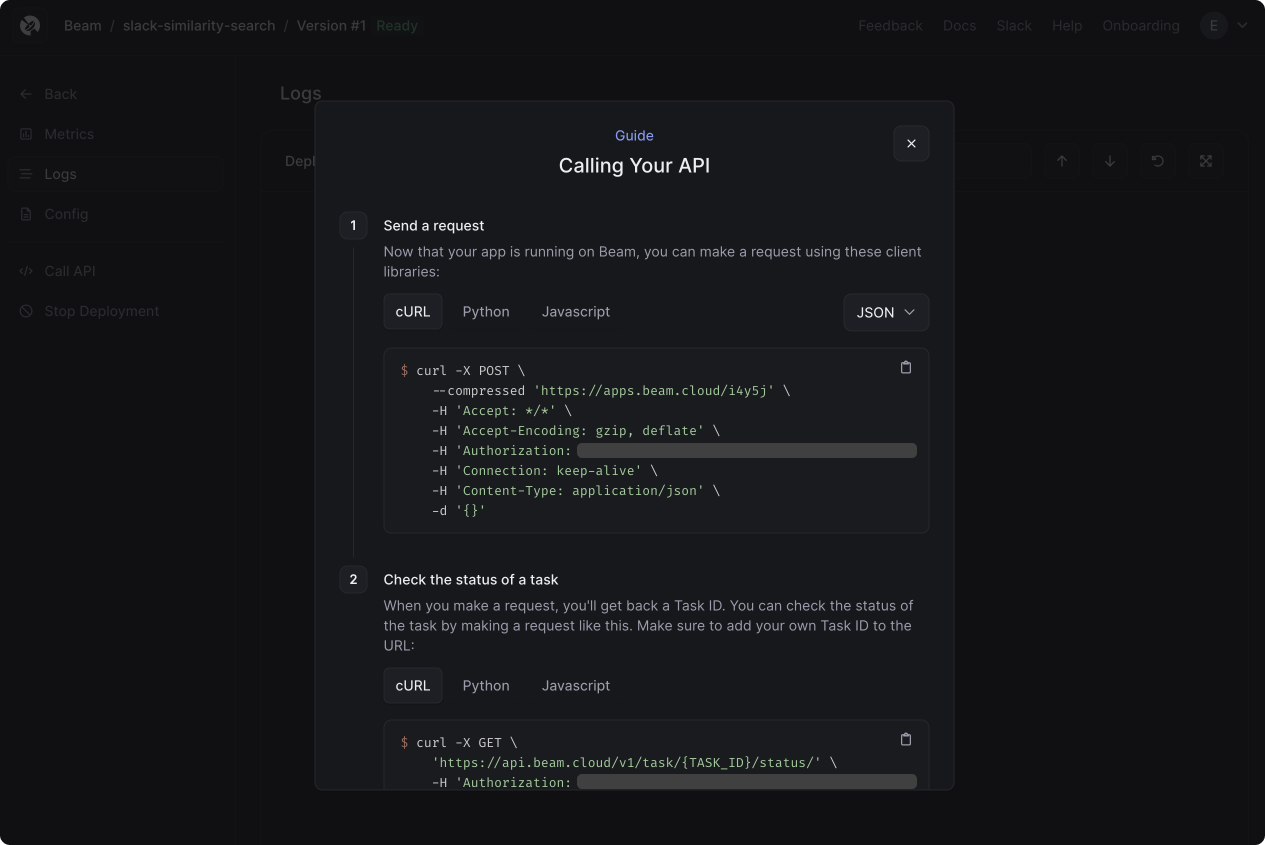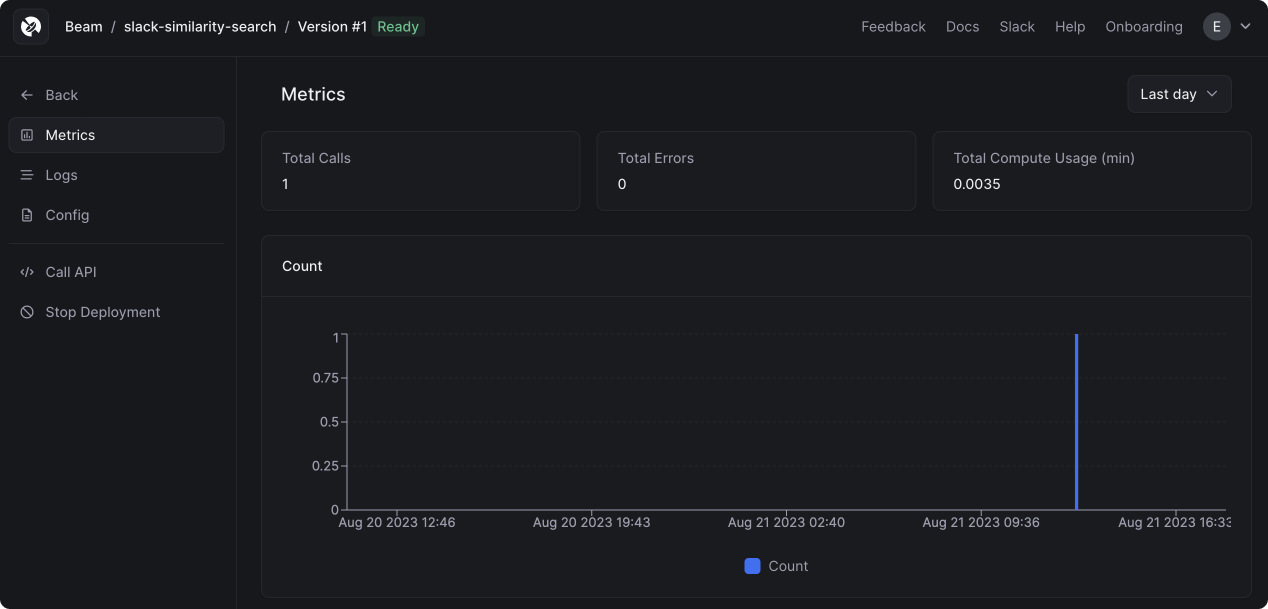Slack Similarity Search, Powered by Metal
 At Beam, we help people easily run AI apps on cloud GPUs. We have a lively support channel in Slack where we provide world-class™ technical support.
We’ve been looking to automate parts of our support workflow. We’ve noticed many of the same questions getting asked over time, and we sometimes find ourselves copying and pasting answers from old threads.
In this example, we’re going to build a simple API to take a support question (i.e. “how does your billing work?”) and return a link to a similar Slack message posted in the past.
We’re going to use Metal to index our Slack messages and run similarity searches and Beam to run the app as a REST API.
At Beam, we help people easily run AI apps on cloud GPUs. We have a lively support channel in Slack where we provide world-class™ technical support.
We’ve been looking to automate parts of our support workflow. We’ve noticed many of the same questions getting asked over time, and we sometimes find ourselves copying and pasting answers from old threads.
In this example, we’re going to build a simple API to take a support question (i.e. “how does your billing work?”) and return a link to a similar Slack message posted in the past.
We’re going to use Metal to index our Slack messages and run similarity searches and Beam to run the app as a REST API.
Pre-requisites
- Metal Account. It’s free to get started, and you can signup here.
- Slack Bot Token. Learn more about generating an access token here.
- Slack Channel ID. You can find the channel ID by clicking your channel name in Slack —>
About —> Copy the channel ID.
Add Secrets
You’ll need to add the following secrets to the Beam Secret Manager:
Metal
METAL_API_KEYMETAL_CLIENT_IDMETAL_INDEX_ID
Slack
SLACK_CHANNEL_IDSLACK_TOKEN

 First, we’ll create an index on Metal.
Metal has two index types: flat and Hierarchical Navigable Small World (HNSW).
Flat uses a simple one-dimensional data structure, and uses nearest neighbors search to find record similarity. In contrast, HNSW works by constructing a hierarchy of different dimensions, which is more efficient and less computationally intensive, at the expense of accuracy.
For this example, we’ll be using the Flat dataset. Our dataset is only 100 records, so the performance penalty of the Flat index shouldn’t be an issue.
First, we’ll create an index on Metal.
Metal has two index types: flat and Hierarchical Navigable Small World (HNSW).
Flat uses a simple one-dimensional data structure, and uses nearest neighbors search to find record similarity. In contrast, HNSW works by constructing a hierarchy of different dimensions, which is more efficient and less computationally intensive, at the expense of accuracy.
For this example, we’ll be using the Flat dataset. Our dataset is only 100 records, so the performance penalty of the Flat index shouldn’t be an issue.

Setup Beam
Next, we’ll setup a Beam Runtime with the remote compute options for the app, and a Beam Image with the Python packages we’ll need to run our code:
from beam import App, Runtime, Image
app = App(
name="slack-similarity-search",
runtime=Runtime(
cpu=1,
memory="8Gi",
image=Image(
python_packages=[
"metal_sdk",
"slack-sdk",
],
),
),
)
Scrape Slack
We’re going to scrape Slack to retrieve all the messages posted in the Channel ID you’ve passed in:
import os
from slack_sdk import WebClient
from slack_sdk.errors import SlackApiError
# Add your own Slack token and Channel ID to the secrets manager in Beam
slack_token = os.environ["SLACK_TOKEN"]
channel_id = os.environ["SLACK_CHANNEL_ID"]
# Retrieve messages from Slack, using the Channel ID set above
def scrape_slack():
client = WebClient(slack_token)
try:
all_messages = []
cursor = None
while True:
response = client.conversations_history(channel=channel_id, cursor=cursor)
all_messages.extend(response["messages"])
cursor = response.get("response_metadata", {}).get("next_cursor")
if not cursor:
break
return all_messages
except SlackApiError as e:
print(f"Error: {e.response['error']}")
return None
index_many(), which is what we’ll use. This method has a limit of 100 records per insertion, so we’re going to limit this to 100 records for now.
The text field of each message is what Metal will use to create a similarity index between messages. We’ll also store the user, message type, and ts (timestamp) of the message as metadata.
# Run this manually to scrape slack and index the messages in Metal
def populate_index():
conversation_messages = scrape_slack()
messages = []
# Loop through all messages, Metal has a limit of 100 records
for message in conversation_messages[:100]:
if len(message["text"]) > 3:
payload = {
"text": message["text"],
"index": os.environ["METAL_INDEX_ID"],
"metadata": {
"user": message["user"],
"type": message["type"],
"ts": message["ts"],
},
}
messages.append(payload)
# Save messages to Metal, in bulk
metal.index_many(messages)
if __name__ == "__main__":
populate_index()
Run on Beam
We’re going to spin up a remote shell on Beam, so that we can run our code in a remote, containerized environment on Beam:
This command will spin up a cloud container with the beam.App() you’ve specified above, and connect it to your local shell. You’ll know you’re connected to the remote environment when you see a red (beam) next to your cursor:
After running populate_index, we’ll see our indexed Slack messages appear in Metal’s dashboard:

Deploy REST API
We’re going to deploy this as a REST API, which will take a query (e.g. “how does billing work?”) and return a link to a Slack conversation related to our query.
First, we’ll use the metal.search() method to query our index for messages related to our query:
metal.search(
{"text": query},
index_id=os.environ["METAL_INDEX_ID"],
limit=5,
)
chat_getPermalink() which will generate a permanent URL to the Slack message returned from our query.
And finally, in order to run this as a REST API, we’ll wrap our function in an @app.rest_api() decorator:
@app.rest_api()
def search_conversations(**inputs):
query = inputs["query"]
metal_response = metal.search(
{"text": query},
index_id=os.environ["METAL_INDEX_ID"],
limit=5,
)
response = json.loads(metal_response.content)
# Get permalink to the relevant Slack conversation
client = WebClient(slack_token)
permalink = client.chat_getPermalink(
channel=channel_id, message_ts=response["data"][0]["metadata"]["ts"]
)
payload = {
"permalink": permalink["permalink"],
"your_query": query,
"original_message": response["data"][0]["text"],
}
print(payload)
return {"results": payload}
beam run command:
beam run app.py:search_conversations -d '{"query": "how does billing work?"}'
(.venv) beta9@MacBook slack-similarity-search % beam run app.py:search_conversations -d \n
'{"query": "how does billing work?"}'
i Using cached image.
✓ App initialized.
i Uploading files...
Uploading app.py 100% |██████████████████████| (4.8/4.8 kB, 8.3 MB/s)
✓ Container scheduled, logs will appear below.
Starting app...
Loading handler in 'app.py:search_conversations'...
Running task: 7e6d55b9-d205-42a1-8b82-f447cca34c5e
{'permalink': 'https://beam-89x5025.slack.com/archives/C04AE0PSN2C/p1690078855794459?thread_ts=1690078855.794459&cid=C04AE0PSN2C', 'your_query': 'how does billing work?', 'original_message': 'Hi, I have a question:\n\nHow is billing charged?\n• Is it charged during spinup time where the API is connecting to an available machine. I assume this is latency, and duration is actual runtime correct? So are we charged for latency as well? What determines latency and will there be more machines added in the future?\n'}
Task complete: 7e6d55b9-d205-42a1-8b82-f447cca34c5e, duration: 0.3453233242034912s
beam deploy command:
beam deploy app.py:search_conversations
 After making a request, you’ll see the call appear in your dashboard:
After making a request, you’ll see the call appear in your dashboard:
 You can also click on the Logs tab to view all the container logs:
You can also click on the Logs tab to view all the container logs:

Conclusion
There’s more work for us to do in operationalizing this code, but it’s a powerful starting point. Metal makes it really easy to store embeddings and search among them. By running this on Beam, we’re able to expose this logic as a serverless REST API using a minimal amount of code and configuration.
Feel free to fork this example and extend it as you wish. We look forward to seeing what you build!






